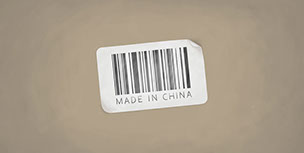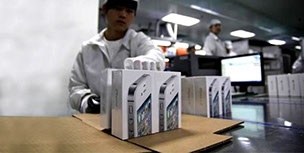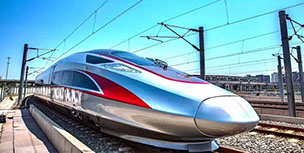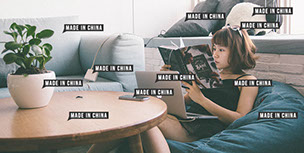
MENU
DOES MADE IN CHINA LABEL STAND FOR POOR QUALITY

The "Made in China" label
The "Made in China" label is the most recognizable label affixed to products in the world, and for most people, it is also synonymous with poor quality and cheap products.
But is it true? Do "Made in China" products still mean what they used to? The answer is more nuanced than what you think.
China's industrialisation
Before the industrial revolution the most famous imported Chinese products were tea, porcelain, coal and silver. But the industrial revolution changed the situation. The modern industries, specially the England's industry, considered their own products to be higher quality. The request to label the origin of the products was the consequence of the Merchandise Marks Act of 1887.
During its industrialisation period, in 1978, China became a commercial gold-rush country for every big companies in the world. In order to improve their profits, those big companies were blindly willing to accept lower quality products, labelled "Made in China".
The label "Made in China" known as cheap and poor quality actually came from the western capitalistic greed for profits.

Consequence of China's industrialisation
The influence of media
Just like for you and me, the media has become a major part of people's lives and we rely on it as a source of information. We can clearly state that the media has a certain influence and impact on people's opinion. The experience we get with a product and its media's coverage shape the image we have of this country.
Over time the stories provided by the media about product safety and the concerns about human rights in China had a huge impact on how we look at the "Made in China" products. But China is a geographically vast country, with billion of people and millions of factories, the percent to encounter problems with products is logically higher.
The other point I want to make concerns the "Nation Branding". It is the strategy of a country to promote itself at home and abroad in order to shape the impression we have of it. It is an important part of a nation's economy to attract tourists, students and companies, to stimulate inward investment and to boost exports.
And in order to not lose its people's trust for their own brand and products, but also its reputation in international relation, it was preferable to blame Chinese factories than the big brand who ordered and imported those cheap quality products.
To blame the Chinese factories for the poor quality is what gave "Made in China" this bad reputation.

Television is part of our lives since we are kid
Western brand's products are manufactured in China
Nowadays people continue to think Made in China products are cheap quality, but do they know that most of the brands they fancy so much are actually Made in China? Indeed, luxury fashion labels now routinely make things in China. Armani, Burberry and Prada manufacture their products from there, because it's cheap but not only : the workmanship is also good.
It's been 35 years that Chinese factories manufacture products for the Western markets, they have gathered technologies, skills and knowledges. Chinese factories do not only produce cheap quality but also top-notch quality products. Even the Japanese brand Visvim, known for its fanatical attention to subtle details, produce high-end, handmade footwear there.
iPhone and other Apple products, which are known as premium products all over the world, are almost all manufactured in China. And I bet you never heard complaints of Apple products being cheap quality. Because they are not and most iPhone users will agree.
With the rise of the wages, some garment production has shifted to those emerging manufacturing countries like India or Bangladesh for their lower wages. China's garment industry has worked hard to improve their quality and speed to remain competitive. Some brands, that I will not mention the name, produce low quality men jeans in Bangladesh but continue to produce women garments in China for their quality.

Apple products are Made in China
Chinese home-grown luxury brands
China has also now its own home-grown fashion and high-tech brands. If you don't believe me here are some example :
80% of all the smartphones available on the market are Chinese brands. Who doesn't know Huawei, Lenovo, OnePlus, Xiaomi, ZTE, Oppo, Alcatel nowadays? They all sell high-end product, for about half the cost of an Iphone, a Galaxy or an HTC One. Their smartphone often are among the top 10 of the best smartphones every year.
What about the fashion brands then? Helen Lee, The Thing, Liu2, Neither Nor, La Vie, Ochirly, Belle, Anta, Metersbonwe, Tata, Youngor, Semir, Septwolves, etc. You maybe don't know those names yet, but in Asia they are all well known, and they start to catch the attention of the Western customers as well.
If you travel to China you may use one of those next generation bullet train "Fuxing", which boasts a top speed of 400kmh (248mph). It is the first bullet train designed and manufactured by Chinese engineers without help from the west. Fuxing bullet trains are also more comfortable as they provide free Wi-Fi coverage and more legroom in all carriages, they are actually so good that even Germany's Deutsche Bahn is reported to consider buying them.
China's railway industry is actually engaged in infrastructure negotiations with 30 countries. With a large domestic market that helps to keep the costs down, the Chinese train industry is well positioned to be far ahead of the competition.

"Fuxing" the Chinese bullet train
"Made in China" label is everywhere
Despite having a negative impression of the "Made in China" label, people still use them everyday. Just look at all the symbols of compliance with standards (CE, UL, GS, etc.) you can find on every products. It's the world's stamp of approval for "Made in China" label.
As long as there is no problem with it, consumers almost never check the origin of a product. If you check around you or what you are wearing, there is a high probability the products you see were produced in China.
Most of these products are manufactured from Chinese factories under Western brand names. It's these companies that specify what quality they want. Chinese factories are good at delivering what was ordered. The fact is until recently, the majority of the things being ordered from Chinese factories were cheap quality.
Many Chinese manufacturers are willing to produce high quality goods, but if the price they are paid by the importer is very low then they will naturally have to sacrifice on materials and/or quality control. The manufacturer does not want to make low quality goods, but he needs to make a profit on his run.

"Made in China" products are everywhere in your home
Conclusion
Are "Made in China" products poor quality only? No certainly not, as I said, you can find top notch quality to bottom on the line products labelled "Made in China".
If consumers buy cheap products, they are mostly going to get cheap quality products too. This has nothing to do with where they are made.
Of course there are still some black sheep manufacturers, but China is also home to highly skilled and specialized industries. Good or bad quality products can come from any country. It's up to the brand who's name will go on it to do its due diligence to ensure that its products are up to its standards.
To make it simple you just get the quality you order and willing to pay.
August 23, 2017 by Nicole